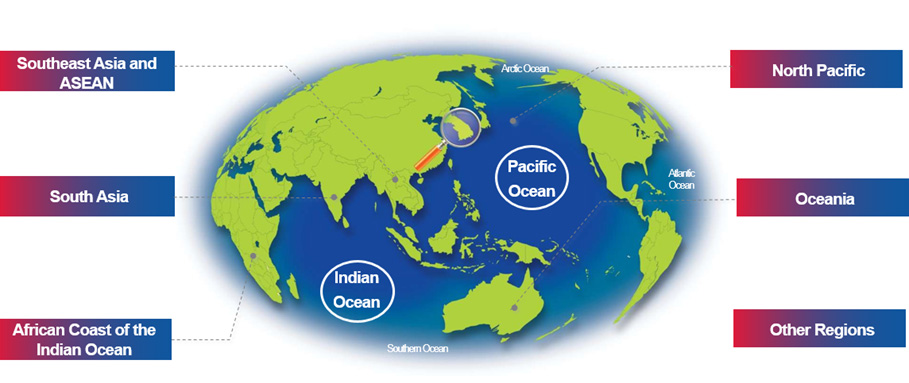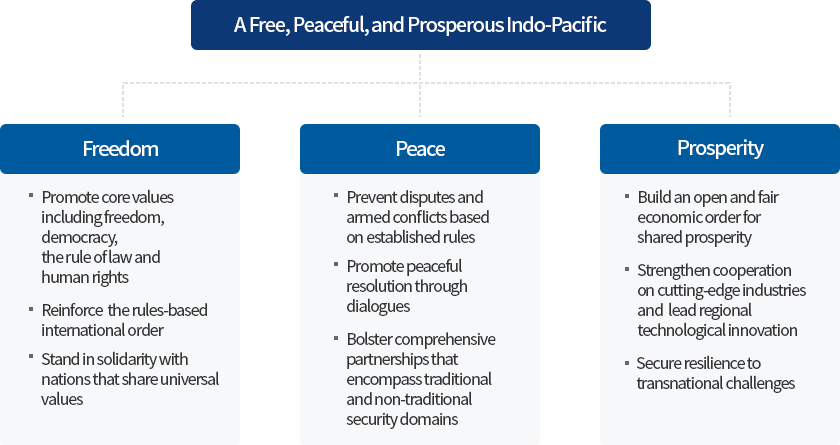-
About the Ministry
About the Ministry
- Press
- Countries & Regions
- Policy Information
- Life In Korea
Introducing the Indo-Pacific Strategy
- Indo-Pacific Strategy
- Korean Peninsula
- Treaties·International Law
- Development Cooperation
- International Organization
- Human Rights
- Environment
- Bilateral Economic Relations
- Public Diplomacy
-
Introducing the Indo-Pacific Strategy
-
What is Indo-Pacific Strategy and its significance?
The Republic of Korea’s Indo-Pacific Strategy is a comprehensive strategy that encompasses the economic and security realms of Indo-Pacific nations. As the Republic of Korea is an Indo-Pacific nation, our national interests are directly tied to the stability and prosperity in the region. While strengthening the rules-based International order, which is conducive to a stable and prosperous Indo-Pacific, we will work towards a regional order that enables a diverse set of nations to cooperate and prosper together.
'Indo-Pacific Strategy.pdf' DOWNLOAD 'Korea as a Global Pivotal State' (VIDEO)'The Action Plan of the ROK(PDF)' DOWNLOAD '2023 Progress Report(PDF)' DOWNLOAD '2024 Progress Report(PDF)' DOWNLOADQuick Facts about Indo-Pacific region
-
Geographical Scope of Indo-Pacific Strategy

The Indo-Pacific Strategy will expand the geographical scope of the Republic of Korea’s foreign policy and breadth of cooperation. Furthermore, it will enable us to further develop our network of strategic partnerships tailored to the Indo-Pacific region, including Southeast Asia, South Asia, Oceania, and the African Coast of the Indian Ocean.
-
Vision: A Free, Peaceful, and Prosperous Indo-Pacific

-
Principles of Cooperation
-
1. Inclusiveness
- Our strategy is an inclusive initiative that neither target nor excludes any particular economy.
-
2. Trust
- We seek reliable partnerships based on trust.
-
3. Reciprocity
- We seek mutually-beneficial cooperation, with the recognition that the most effective engagements are those that benefit all parties.
-
-
Core Lines of Effort
- ① Build Regional Order Based on Norms and Rules
-
In realizing the vision for a free Indo-Pacific, the Republic of Korea is committed to partnering with like-minded countries that share the values of freedom, rule of law, and human rights as well as international norms to contribute to the stability and prosperity of the Indo-Pacific region. We will stand with the international community in condemning and responding firmly to actions that threaten universal values and international norms. We will also play a leading role to strengthen the rules-based international order by respecting and enforcing internationally-agreed rules, and establishing new rules to govern emerging domains based on universal values and norms.
- ② Cooperate to Promote Rule of Law and Human Rights
-
Article 1 of the United Nations Charter establishes the maintenance of international peace and security as the primary purpose of the United Nations, and provides that settlement of international disputes shall be brought about by peaceful means and in conformity with the principles of justice and international law. As a model democracy,the Republic of Korea will remain committed to promoting freedom, democracy, the rule of law, and human rights.
- ③ Strengthen Non-Proliferation and Counter-Terrorism Efforts Across the Region
-
The Republic of Korea will contribute to preserving peace in the Indo-Pacific by strengthening security cooperation with key partners in the region. Peace on the Korean Peninsula and in Northeast Asia is vital for world peace and essential for preserving and expanding freedom in Korea and across the world. Notably, the complete denuclearization of North Korea is critical for maintaining sustainable peace on the Korean Peninsula, in East Asia, and in the world at large. Based on the ROK-U.S. Alliance, we will maintain and strengthen our robust combined defense posture against North Korea’s nuclear and missile threats, while expanding ROK-U.S.-Japan trilateral security cooperation to reinforce our capability to safeguard peace.
- ④ Expand Comprehensive Security Cooperation
-
Addressing complex security challenges of the 21st century requires a multi-dimensional and holistic approach. Accordingly, the Republic of Korea will seek comprehensive regional security cooperation encompassing traditional and non-traditional threats to security.
- ⑤ Build Economic Security Networks
-
The Republic of Korea will expand regional economic security networks for stable and resilient supply chain management, while promoting free trade and a rules-based economic order in the Indo- Pacific. We will participate actively in multilateral cooperation to establish an early warning system and resilient supply chains of key industries and items. We will also increase bilateral and minilateral communication and cooperation to diversify our economic ties and ensure stable supply chains. In order to stabilize supply chains of strategic resources, we will seek cooperation with partners with whom we share values.
- ⑥ Strengthen Cooperation in Critical Domains of Science and Technology and Close Digital Gap
-
As a global leader in science and technology innovation, the Republic of Korea will facilitate regional cooperation in critical domains of science and technology, including semiconductors, artificial intelligence, quantum science, advanced biology, next generation telecommunications and space, and help close the digital gap in the region. Technologies determine a nation’s security and competitiveness for the future. Ultimately, they will be conducive to a free and prosperous region when used in the service of fostering cooperative international relations. Accordingly, we will bolster international cooperation in relation to critical and emerging technologies, including research and development, standardization, technology norms, and fostering and protection of technology and human resources. We will engage in collaborative networks with the U.S. and other technology leaders, while expanding technology cooperation with Europe, Canada, and Australia.
- ⑦ Lead Regional Cooperation on Climate Change and Energy Security
-
The Republic of Korea will support the region’s achievement of SDGs in the areas of climate change response, energy transition, and energy security, and also lead regional efforts to ensure better resilience to transnational challenges. We will contribute to the resolution of regional and global issues by pursuing various forms of minilateral cooperation with countries both in and outside the region.
- ⑧ Engage in “Contributive Diplomacy” through Tailored Development Cooperation Partnerships
-
As a Global Pivotal State, the ROK will contribute to the economic and social development of the Indo-Pacific through “contributive diplomacy” commensurate with its economic stature, and strengthen the foundation for realizing peace and prosperity in the Indo-Pacific region. The ROK is the only country to rise up from being among the world’s poorest country on the receiving end of aid to become an OECD donor country. As such, the ROK is ready to share the experiences and knowledge accumulated thus far, and help meet the aspirations of the countries in the region to achieve national development and economic growth.
- ⑨ Promote Mutual Understanding and Exchanges
-
With a view to becoming a Global Pivotal State, the ROK will promote customized two-way exchanges in the Indo-Pacific. In particular, we will make efforts to invigorate exchanges between youths, who are our future. Building mutual trust and friendship between future generations forms the bedrock of healthy and mature relations among countries, and cultural exchange is the most effective and attractive way to connect youths and cultivate shared historical awareness in the Indo-Pacific region. Diverse cultural and people-to-people exchanges will lay the foundation for strong solidarity between the future generations of the Indo-Pacific region.
-
Related Speeches and Meetings
-




